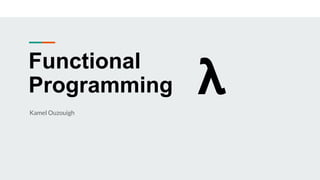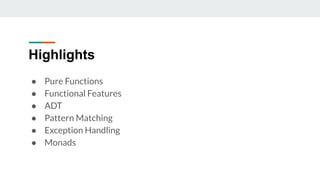Functional Programming
- 2. Highlights ‚óè Pure Functions ‚óè Functional Features ‚óè ADT ‚óè Pattern Matching ‚óè Exception Handling ‚óè Monads
- 3. What is Functional Programming ? Pure functions Immutable values 1 2
- 4. Pure function Given the same input, will always return the same output Doesn’t have any side effects 1 2
- 5. Pure function // pure Math.Max(5, 8) "Typescript".Length "Typescript".ToUpper() var numbers = new List<int> { 0, 8, 9, 1 }; numbers.OrderBy(x => x) numbers.Where(x => x % 2 == 0) // impure var numbers = new List<int> { 0, 8, 9, 1 }; numbers.Sort(); Action<String> greeting = name => { Console.WriteLine("hi" + name + " !"); }
- 6. Benefits of pure functions Easier to reason about 1 2 3 4 5 6 7 Easier to combine Offer Referential Transparency Easier to parallelize Are Memoizable Can be lazy Easier to test
- 7. How about I/O ? I/O Wrapper code
- 9. What is a Function? Map between values (ex: string -> int) Methods, Lambdas, Maps 1 2
- 13. Currying
- 14. Currying Example
- 15. Pattern Matching
- 16. Algebraic Data Type(ADT) Algebra consists of: A set of objects The operations that can be applied to those objects to create new objects 1 2 Examples Numeric Algebra Relational Algebra
- 17. Algebraic Data Type(ADT) Algebraic Data Types are combination of other types
- 19. Algebraic Data Type(ADT) Product Type
- 21. Algebraic Data Type(ADT) Sum Type
- 22. Pattern Matching A pattern match combines an applicability test and destructuring bind Destructuring bind extract values from an object Applicability test determines if the pattern matches the target 1 2
- 24. Pattern Matching Over Inheritance / Closed Hierarchy
- 25. Pattern Matching Over Inheritance / Closed Hierarchy
- 26. Pattern Matching Over Inheritance / Closed Hierarchy
- 27. Pattern Matching Over Inheritance / Closed Hierarchy / C#8
- 28. Handling Errors
- 30. Alternatives to Null How to deal with Null value ?
- 32. Null Check FP Solution
- 33. Null Check FP Solution Accessing Values
- 34. Functor
- 36. Functor
- 37. Monad
- 39. Monad
- 40. Monad
- 41. Option aka Maybe
- 42. Option aka Maybe
- 43. Either Type
- 44. Either Type
- 45. Either Type
- 46. Either Type















































